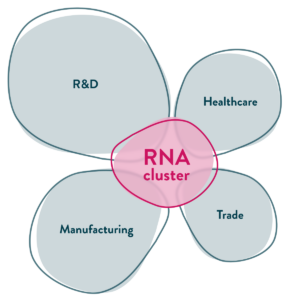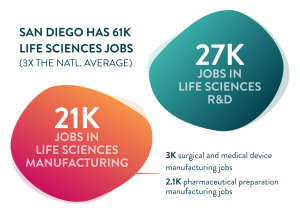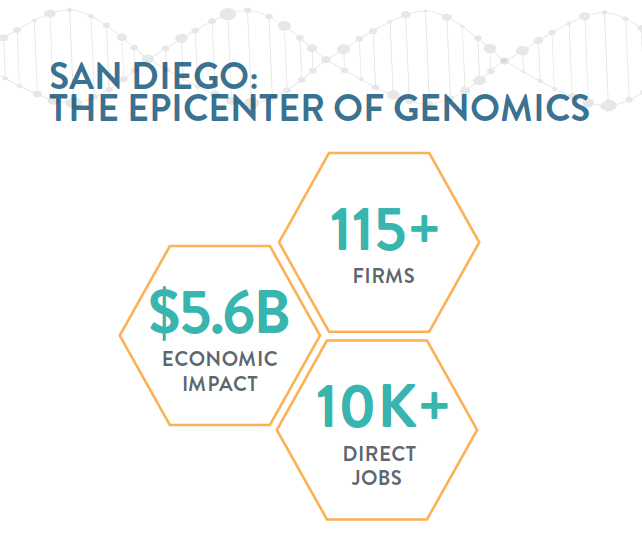EDC study explores the power and impact of RNA before and beyond COVID-19
Together with 1STRAND, EDC released “San Diego’s RNA cluster: Powering public health and the economy,” a comprehensive overview and economic impact assessment of San Diego’s RNA cluster, including direct input from industry representatives and stakeholders.
The power of gene expression manipulation has unlocked possibilities that were once unthought of—advanced treatments for cancer, HIV vaccines, personalized medicine, and more. These scientific achievements, discoveries, and events have catalyzed the growth of RNA innovation and therapeutics.
Home to dozens of RNA firms supporting more than 11,000 jobs, San Diego is especially well positioned to lead in RNA therapeutics innovation, promising a bright future for the region’s Life Sciences ecosystem and the broader economy.
KEY report FINDINGS
- San Diego’s RNA cluster is a major contributor to the regional economy, with a nearly $6 billion annual impact. For every 100 jobs generated within the cluster, an additional 150 jobs are supported across the region.
- San Diego’s RNA cluster has capabilities in both research and development (R&D) and manufacturing. While R&D leads RNA activities in the region, San Diego’s expertise in advanced manufacturing offers a solid foundation for further growth.
- Leveraging its expertise in RNA technology, San Diego proved resilient and important in the fight against COVID-19. The region drew in $59 million from the National Institutes of Health (or NIH) and employment grew nine percent through 2021.
- Software development jobs continue to grow within San Diego RNA firms. Demand for these professionals is expected to rise as Artificial Intelligence and Machine Learning (AI-ML) are further integrated.
- Talent attraction is a major challenge for local RNA companies. Compensation is not keeping pace with San Diego’s high cost of living and puts the region seventh out of 10 in average wages among peer metros.

RNA and RNA therapeutics sit at the intersection of four sectors: R&D, manufacturing, trade, and healthcare. These include operations such as medical laboratories, production of biological materials and lab instruments, drug wholesalers, and consulting services to name a few—all of which are part of a broader ecosystem of industries fueling San Diego’s RNA cluster. This broader ecosystem feeds RNA clusters across the country, and San Diego consistently ranks among the top 10 metros in terms of total jobs, job concentration, and average wages. Peer metros includes Life Sciences heavyweights Boston and San Francisco, as well as parts of the North Carolina Research Triangle and tech hubs Seattle and San Jose.
Among peer metros, San Diego ranks:
- #2 in job growth (nine percent) from 2021
- #2 in projected job growth (13 percent) by 2027
- #3 in number of job postings
- #4 in median advertised salary for RNA jobs at just under $85,000
- #7 in average hourly compensation ($56.68) for RNA jobs
- Home to #5 most funded institution in the U.S. in RNA-related projects, and #2 in California – UCSD
The study was produced by EDC on behalf of 1STRAND in June 2023. Learn more about EDC’s research here.
 Life Sciences is an integral and rapidly growing piece of the San Diego regional economy. In 2021 alone, San Diego Life Sciences companies pulled in 13.1 percent of the $38.6 billion invested into Life Sciences nationwide. Supporting this growth, San Diego ranks fourth (4,300 in 2020) in Life Sciences degree completions among peer metros. Future and ongoing investment in Life Sciences companies and talent—most especially around compensation and accessibility—will ensure the longevity of this high impact industry and support its ability to compete.
Life Sciences is an integral and rapidly growing piece of the San Diego regional economy. In 2021 alone, San Diego Life Sciences companies pulled in 13.1 percent of the $38.6 billion invested into Life Sciences nationwide. Supporting this growth, San Diego ranks fourth (4,300 in 2020) in Life Sciences degree completions among peer metros. Future and ongoing investment in Life Sciences companies and talent—most especially around compensation and accessibility—will ensure the longevity of this high impact industry and support its ability to compete.

